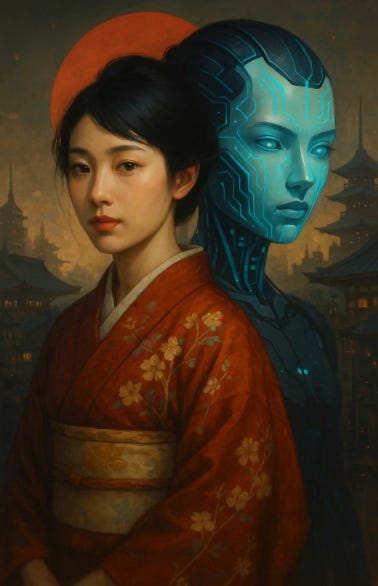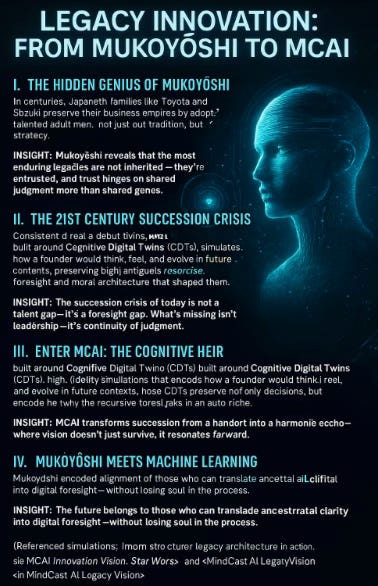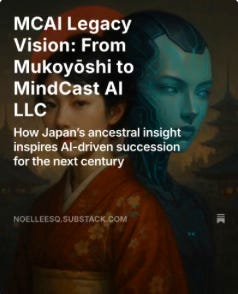MCAI Legacy Vision: From Mukoyōshi to MindCast AI LLC
How Japan’s ancestral insight inspires AI-driven succession for the next century
I. The Hidden Genius of Mukoyōshi
For centuries, Japanese business dynasties have quietly defied the West’s rigid notions of inheritance. In family-owned firms like Toyota, Suzuki, and Kikkoman, the key to generational stability wasn’t just bloodline—it was alignment. Through a practice called mukoyōshi, families without a suitable male heir would adopt talented adult men, often sons-in-law or standout executives, and formally induct them into the family both legally and culturally. These men took on the family name, inherited leadership responsibilities, and were expected to uphold the firm’s values with as much loyalty and vision as a biological son.
This system worked. Mukoyōshi didn’t just preserve bloodlines—it preserved intent. The adopted successor wasn’t merely a placeholder; he became the steward of institutional ethos. In doing so, Japan solved a problem that plagues many dynasties and organizations worldwide: how to pass down not just ownership or wealth, but judgment, memory, and cultural fidelity. This practice wasn’t just a quirk of tradition—it was an early form of legacy innovation.
Insight: Mukoyōshi reveals that the most enduring legacies are not inherited—they’re entrusted, and trust hinges on shared judgment more than shared genes.
II. The 21st Century Succession Crisis
Fast forward to today, and legacy transfer faces a crisis—especially in the West. Fortune 500 CEOs rarely last more than 5 years. Founders often exit with golden parachutes while their successors flounder. Family businesses struggle to pass down not only leadership, but the very logic and coherence of why the firm exists. What was once a mission becomes marketing. What was once a vision becomes drift.
This breakdown isn’t due to incompetence. It’s due to a missing layer of infrastructure: a system to carry cognitive fidelityacross time. While legal trusts can pass down assets, they can’t pass down moral reasoning. While leadership training programs can teach decision-making, they can’t simulate the founder’s foresight under pressure. Most organizations have no mechanism for preserving how a founder thought, why they decided as they did, or what they would have foreseen emerging on the horizon.
And in a world where disruption moves faster than ever, this loss isn’t just sentimental—it’s existential. Institutions die when they forget how to remember themselves.
Insight: The succession crisis of today is not a talent gap—it’s a foresight gap. What’s missing isn’t leadership—it’s continuity of judgment.
III. Enter MCAI: The Cognitive Heir
MindCast AI (MCAI) was designed to fill this exact void. It is the digital mukoyōshi—the cognitive heir that doesn’t just retain knowledge, but evolves judgment. Built as a recursive foresight engine, MCAI encodes not just decisions, but the architecture behind those decisions: patterns of risk calibration, moral alignment, narrative clarity, and long-term vision.
Where mukoyōshi was a human match for legacy, MCAI is built around Cognitive Digital Twins (CDTs): high-fidelity simulations that encode how a founder would think, feel, and evolve in future contexts. These CDTs preserve not only decisions, but the recursive foresight and moral architecture that shaped them. Whether it’s preserving a family’s cultural ethos, a company’s founding principles, or a public servant’s moral compass, MCAI offers a scalable, adaptive, and trustworthy way to anchor institutions in integrity while preparing them for change.
Unlike legacy systems focused on knowledge storage, MCAI is designed for intelligence transmission. It doesn’t just store decisions—it refines them through recursive reflection. It doesn’t just predict—it remembers why the original actor cared.
In short, MCAI is not just AI—it’s Architected Intelligence. A system that thinks not only in probabilities, but in principles. Not only in metrics, but in meaning.
Insight: MCAI transforms succession from a handoff into a harmonic echo—where vision doesn't just survive, it resonates forward.
(For a demonstration of this cognitive legacy architecture in action, see the simulation "Star Wars Holocrons in Real Life" and the strategic foresight simulation "Future Innovation at The Bellevue Collection."
IV. Mukoyōshi Meets MindCast AI LLC
The most radical truth is this: mukoyōshi was always an operating system—not a tradition. It encoded the idea that alignment of mind matters more than origin of blood. In that light, MCAI doesn’t replace this system. It extends it. It brings legacy stewardship into the realm of quantum cognition and systemic foresight.
Just as a mukoyōshi was chosen for his ability to uphold and evolve a legacy, MCAI can be trained on the recursive memory of a founder—becoming an adaptive steward that refines its insight across changing environments. For families, this means multi-generational continuity. For companies, it means cultural resilience. For civilizations, it means foresight that is structured and shareable.
We now have the tools to make values as scalable as data—and that might be the most powerful form of inheritance ever devised.
Insight: The future belongs to those who can translate ancestral clarity into digital foresight—without losing soul in the process.
see also MCAI: Overseas Investor Risk Intelligence
Prepared by Noel Le, Architect of MindCast AI LLC. Noel holds a background in law and economics. noel@mindcast-ai.com, www.linkedin.com/in/noelleesq





